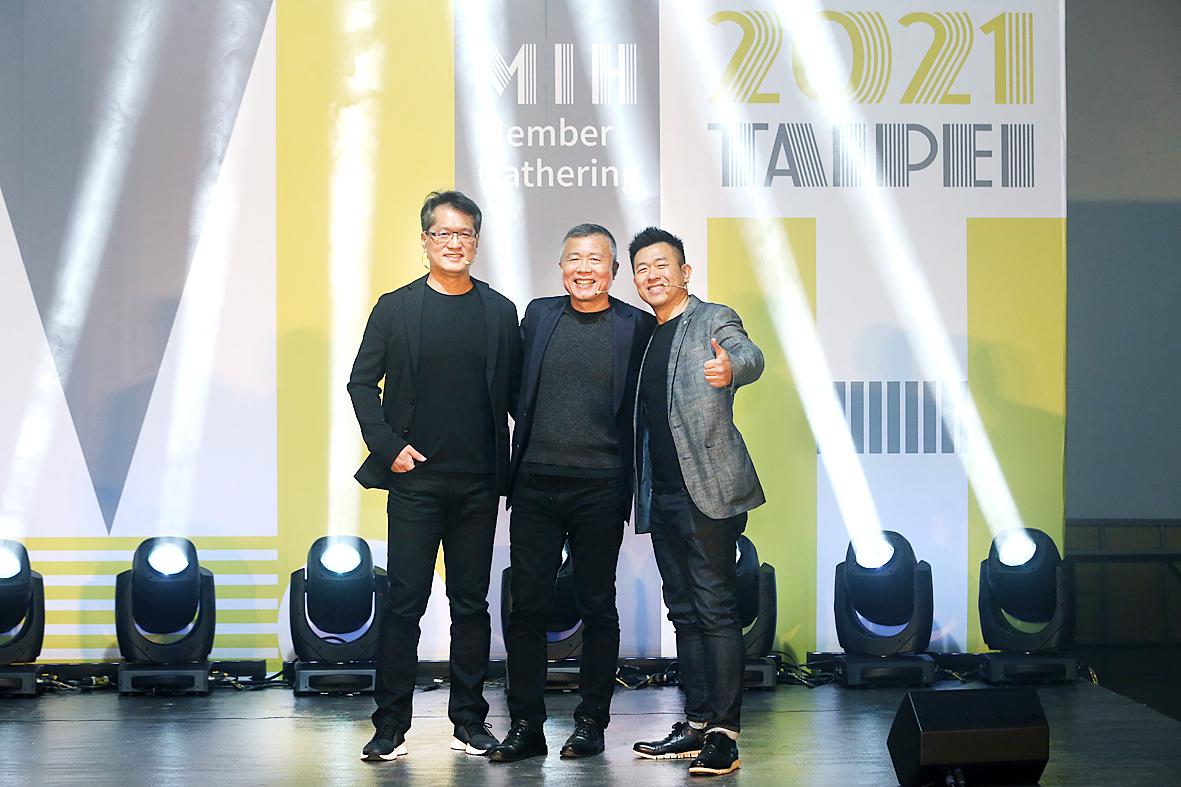Hon Hai Precision Industry Co’s (鴻海精密) MIH platform for electric vehicles (EVs) is to become an independent business unit in July, the company said at the first MIH Open Platform Alliance membership meeting in Taipei yesterday.
More than 1,200 companies in the EV supply chain have joined the alliance since its inception in October last year.
Hon Hai chairman Young Liu (劉揚偉) said that the firm’s goal is to consolidate Taiwan’s EV component makers so that they can cooperate with each other.

Photo: Chen Rou-chen, Taipei Times
“Due to Taiwan’s limited domestic market, it is hard to develop a business-to-consumer model,” Liu said. “However, a platform to bring together all of the nation’s talent on a business-to-business basis is perfect for the development of EVs.”
The development of “software-defined vehicles” was central to the member-only meeting in the Songshan Tobacco Factory in Taipei, which was livestreamed online.
“In the future, you will be able to develop 80 percent of an EV’s functions on the cloud,” Hon Hai chief technology officer William Wei (魏國章) said.
“Our goal is to provide vehicle developers with a complete stack development environment that mimics today’s development environment for consumer electronics,” Wei said. “It will be like what we had for desktop computers for the past 20 years and for smartphones in the past 10 years.”
Wei said that the EV development cycle can be shortened, from five years to two-and-a-half years, and development costs and risks reduced through cloud-based systems.
EV design can be streamlined by “pushing the whole system layer to the application layer,” Wei said.
“We push the domain of battery management into the application layer so that everybody can join in disrupting the space,” he said.
Among the MIH members is Tony Lin (林東閔), chief executive officer of Aeon Motor Co (宏佳騰), a maker of electric scooters.
Lin said that through flexibility in EV development, a whole new mobility market would emerge.
The MIH platform can accommodate vehicles as diverse as busses and microvehicles, he said.
“When you call a Uber you are hiring a five-person sedan with a driver to carry one passenger,” Lin said, referring to the California-based ride-hailing service.
“What if in the future you can just hire a 1-seater autonomous car?” Lin said. “Taiwan needs this alliance to bring us together so we can be seen by the world.”

SEMICONDUCTORS: The German laser and plasma generator company will expand its local services as its specialized offerings support Taiwan’s semiconductor industries Trumpf SE + Co KG, a global leader in supplying laser technology and plasma generators used in chip production, is expanding its investments in Taiwan in an effort to deeply integrate into the global semiconductor supply chain in the pursuit of growth. The company, headquartered in Ditzingen, Germany, has invested significantly in a newly inaugurated regional technical center for plasma generators in Taoyuan, its latest expansion in Taiwan after being engaged in various industries for more than 25 years. The center, the first of its kind Trumpf built outside Germany, aims to serve customers from Taiwan, Japan, Southeast Asia and South Korea,

Gasoline and diesel prices at domestic fuel stations are to fall NT$0.2 per liter this week, down for a second consecutive week, CPC Corp, Taiwan (台灣中油) and Formosa Petrochemical Corp (台塑石化) announced yesterday. Effective today, gasoline prices at CPC and Formosa stations are to drop to NT$26.4, NT$27.9 and NT$29.9 per liter for 92, 95 and 98-octane unleaded gasoline respectively, the companies said in separate statements. The price of premium diesel is to fall to NT$24.8 per liter at CPC stations and NT$24.6 at Formosa pumps, they said. The price adjustments came even as international crude oil prices rose last week, as traders

Taiwan Semiconductor Manufacturing Co (TSMC, 台積電), which supplies advanced chips to Nvidia Corp and Apple Inc, yesterday reported NT$1.046 trillion (US$33.1 billion) in revenue for last quarter, driven by constantly strong demand for artificial intelligence (AI) chips, falling in the upper end of its forecast. Based on TSMC’s financial guidance, revenue would expand about 22 percent sequentially to the range from US$32.2 billion to US$33.4 billion during the final quarter of 2024, it told investors in October last year. Last year in total, revenue jumped 31.61 percent to NT$3.81 trillion, compared with NT$2.89 trillion generated in the year before, according to

PRECEDENTED TIMES: In news that surely does not shock, AI and tech exports drove a banner for exports last year as Taiwan’s economic growth experienced a flood tide Taiwan’s exports delivered a blockbuster finish to last year with last month’s shipments rising at the second-highest pace on record as demand for artificial intelligence (AI) hardware and advanced computing remained strong, the Ministry of Finance said yesterday. Exports surged 43.4 percent from a year earlier to US$62.48 billion last month, extending growth to 26 consecutive months. Imports climbed 14.9 percent to US$43.04 billion, the second-highest monthly level historically, resulting in a trade surplus of US$19.43 billion — more than double that of the year before. Department of Statistics Director-General Beatrice Tsai (蔡美娜) described the performance as “surprisingly outstanding,” forecasting export growth